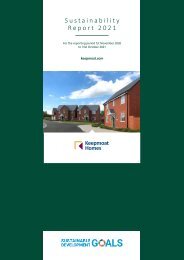Consumer-Code-Book-v4-Feb2023
Create successful ePaper yourself
Turn your PDF publications into a flip-book with our unique Google optimized e-Paper software.
2.7 Contract of sale<br />
The developer must make sure that the terms of the contract of sale are clear, fair and written<br />
in plain language, and that they keep to all relevant legislation. The contract of sale must do<br />
the following.<br />
a) Define the completion notice period (that is, the period from the date the notice to<br />
complete is served to the completion date).<br />
b) Clearly set out the circumstances in which the customer can cancel the contract of sale. This<br />
might include, for example, if there is:<br />
• a change to the new home that the customer has not agreed to and which affects the<br />
size, value or appearance of the new home (including, the size and layout of the rooms);<br />
or<br />
• an excessive or unreasonable delay in completing the construction of the new home<br />
and sending the notice to complete to the customer.<br />
c) Clearly explain what will happen if the new home will not be ready for the sale to complete<br />
by the date the developer said it would be ready.<br />
d) Clearly explain how deposits will be protected.<br />
e) Make suitable arrangements to provide a two-year builders’ liability period for the<br />
customer. This also applies to special purpose vehicles (see glossary) and other short-term<br />
trading arrangements which may be formed to build a specific new home or development.<br />
To avoid disputes over spoken statements, immediately before contracts are exchanged,<br />
the developer should make sure that the customer, through their legal representative, states<br />
in writing any spoken statements they are relying on when entering into the contract of sale.<br />
2.8 Keeping the customer informed and pre-completion inspection checks<br />
The developer must give the customer an opportunity to visit the new home, and appoint a<br />
suitably qualified inspector to carry out the pre-completion inspection on their behalf, before<br />
the completion date and within the five days after the notice to complete has been served (or<br />
earlier if the developer and the customer both agree to this).<br />
The inspection should be carried out and recorded in line with the template pre-completion<br />
inspection checklist. Inspectors can reproduce the checklist in an electronic or digital format.<br />
However, they must carry out the checks shown on the original template.<br />
The completion notice period is usually expected to be at least 14 calendar days (unless the<br />
developer and the customer agree otherwise). This is to make sure there is enough time for all<br />
the necessary legal requirements to be met and for the pre-completion inspection to be<br />
carried out. To avoid doubt, the pre-completion inspection checklist is not intended to delay<br />
or prevent completion happening in line with the notice to complete, but the developer must<br />
respond to the results of the inspection in line with the conditions set out in part 3.<br />
The developer should explain the process for keeping the customer up to date on the timetable<br />
for when the new home is likely to be ready and give them updates at appropriate times.<br />
The developer must make sure that their sites meet all relevant health and safety legislation<br />
and give appropriate guidance to visitors.<br />
The developer must tell the customer about the health and safety precautions they must take<br />
if they are allowed to visit a construction site before the work is finished. The developer can<br />
refuse to give the customer (or any representative, inspector or professional acting on their<br />
behalf) access if they do not take any health and safety precautions the developer has told<br />
them they must take.<br />
2.9 Changes, agreeing to major changes, and the customer’s right to cancel<br />
The developer must tell the customer about their right to cancel the reservation agreement<br />
and contract of sale and the specific circumstances when they can exercise this right.<br />
The developer must tell the customer in writing if there is a major change to the details shown<br />
in the reservation agreement or contract of sale after the customer enters into the reservation<br />
agreement. A major change is a change that alters the size, appearance or value of the new<br />
home (including the layout inside the home).<br />
The developer should tell the customer that they should ask their professional adviser for advice.<br />
If the customer finds the major changes unacceptable, they have the right to cancel the<br />
reservation agreement or contract of sale and receive a full refund of their contract deposit,<br />
reservation fee and any other payments they have made, as long as they cancel within 14 days<br />
of receiving written details of the major change. The notice to complete cannot be served<br />
during the 14-day cancellation period.<br />
The developer must keep the customer informed of changes to the design, construction or<br />
materials of the new home which are not major changes. The customer does not have the right<br />
to cancel the reservation agreement or contract of sale following changes such as these, and<br />
they do not have to formally agree to them. However, they still have the right to complain<br />
about any snags even if they have not agreed to the changes.<br />
If the developer has agreed to do extra work for the customer which will change the timescale<br />
for finishing the new home, the anticipated completion date may need to be delayed and<br />
other amendments may need to be made to the reservation agreement or contract of sale (or<br />
both). The developer should tell the customer they should get legal advice about the extra<br />
work and any changes this may lead to.<br />
In Scotland, if the developer changes the materials that will be used in the new home, they<br />
must make sure that the new materials still meet the relevant building warrant. Nothing in this<br />
section relating to discussions with the customer takes away this legal obligation.<br />
2.10 Complete new home<br />
Completion can only take place on a complete new home which meets the building regulations<br />
and all building safety requirements that apply. Completion must not take place on a new home<br />
that is not a complete new home, and the developer must not offer the customer an incentive<br />
(financial or otherwise) to move into, or complete the purchase of, a new home that is not a<br />
complete new home.<br />
A complete new home is one that has proof of new home warranty insurance issued for it and<br />
meets the following further conditions.<br />
Further conditions for houses<br />
If the new home is a house, it is a complete new home if all rooms, spaces and facilities are in a<br />
finished condition for the purpose they were designed and intended for, the property has a safe<br />
entrance and emergency exit routes, and any further work needed:<br />
Part 2: Legal documents, information, inspection and completion<br />
Part 2: Legal documents, information, inspection and completion<br />
18 19<br />
<strong>Consumer</strong> <strong>Code</strong> <strong>Book</strong> Print <strong>v4</strong>.indd 18-19 24/02/2023 10:16










